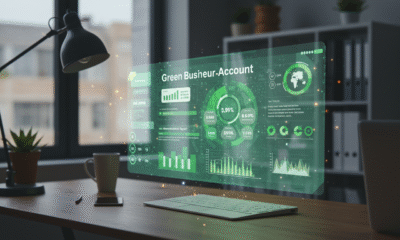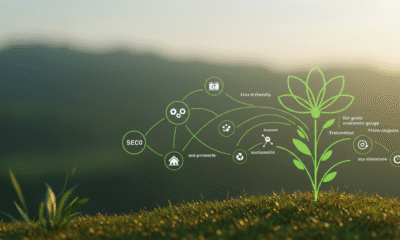

Features
What Are the Benefits of Studying Sustainability Management?
The WMO climate report just made an earth-shattering revelation. It stated that we are heading into “unchartered territory of destruction.” Businesses need to do their part to help change course before it is too late.
It’s becoming apparent that with most news headlines recently, the environment is facing a difficult time. In 2015, we reported that climate change was already having a huge impact on weather. Things have only gotten worse since we first published that article. Western Europe has been struck by droughts, wildfires, and pretty much the entire globe has experienced a rise in temperatures. The knock-on effects of these have led to disruptions to agriculture, human and animal deaths, hose pipe bans, and many other issues.
Whether it was a G20 meeting or the late Queen’s speech (may she rest in speech), climate change and sustainability are becoming a central focus of not just politics, but business. It’s becoming the absolute priority for the entire world regarding the future of society and the environment itself.
Sustainability is often thought of as a societal issue, and therefore one for our government to solve. But there are two reasons why it concerns businesses so much as well. First of all, many of the policies used to promote sustainability are targeted to businesses, as they play the biggest role in the production of new goods and services. Also, consumers are becoming increasingly conscious in their behaviors, incentivizing more businesses to market their services to them.
The truth is that sustainability in business is more important than ever. You need to take steps to help lower your employer’s carbon footprint. A degree in sustainability management can help.
Demand for Green Solutions Creates a Growing Demand for Sustainability Management Professionals
Due to the growing need to improve business practices and operations to meet new sustainability standards, there is a growing demand for sustainability management professionals. What services can these experts offer to companies striving to be more eco-conscious?
You should consider the benefits of getting a Master in sustainability before pursuing a career in this field. You want to know what you can offer to an employer. The biggest benefit is that you can help them break down existing models of production and change business activity and modify business practices to better align with the visions of eco-friendly businesses.
It’s not just social interest and expectations that businesses are hiring sustainability management professionals. Economic incentives are also driving the need for these professionals. Shareholder profits remain a priority, but businesses want to partner and collaborate with businesses that are excelling in terms of sustainability. Nobody wants to be associated with companies that are bad for the environment or receive negative PR, which is why business relations is a big part of sustainability. Knowing where your product originates from and the sustainability practices of your supplier, for example, is important as an eco-friendly business.
Career opportunities
Because of this growing demand for sustainability management professionals, there are growing career opportunities. The International Labour Organization estimates that there will be 24 million new sustainability and digitalization jobs in the next few years. There are drastic shifts in the production system every day, which is further perpetuated by the conflict in Ukraine and its implication over energy supplies in Europe.
Furthermore, sustainability management is a theoretical field. It is actually more theoretical than most other areas within most businesses. This implies that graduate jobs that don’t require any experience are likely to be more common than in other areas. Fortunately, due to the positive impact of sustainability, there are many ways to gain experience with non-profit companies and charities. These can be easier for people to find jobs with. New entrants into the profession may not be paid but they could have a huge competitive advantage for a graduate’s CV. Voluntary work shouldn’t be a prerequisite, but having plenty of opportunities to do so (compared to say a procurement buyer role) can only be a good thing.
A Master’s of science in sustainability is also considered a fantastic add-on to a degree in a specific field. For example, an economics major can decide to spend another year of studies in sustainability without needing a 3-year sustainability degree. This allows students to decide during their bachelor’s degree that they want to make a positive impact during their career, making the extra year of master’s an ideal steppingstone into this field.
Positive impact
It’s not all about money and career opportunities, either. Many of us are searching for ways to spend our time meaningfully, and struggle to see how our career can align with this. With sustainability management, the 9-to-5 routine becomes a lot more alluring when you know that you’re making a positive difference in society.
Within sustainability management, there’s room for specialization. There are economic, social, and environmental aspects that can be focused on according to your interests – but ultimately these skills are transferable and blend well.
To be more specific, an environmentally focused sustainability management student may focus on the carbon footprint produced during production and logistics, and how current policy changes impact the company in a political, legal, and business sense. A socially-focused student, though, may specialize in corporate social responsibility and environmental law.
If there is one thing that companies like to talk about, it’s the positive impact they have had on the world. For example, a sanitation company boasting about how much water they have saved, and similar statistics are often central to shareholder presentations and marketing. This is great for those working on these problems as they do not go unnoticed – your work will be highly praised, visible, and applauded more than perhaps any other area within the business.
It’s a problem and goal-orientated field, too, meaning you will always have a direction to head in and can act with purpose. Three’s no “make profit for profit’s sake” here, but rather to be the conscious voice in the company and help keep them on track with their sustainability goals.






























